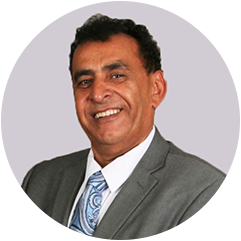Webpage

Improving Patient Outcomes: A Deep Dive into ML/AI-Driven Predictive Analytics in Healthcare

Hassan M. Sharif, SVP, Healthcare Solutions
Hassan is the Senior Vice President of Healthcare Solutions at Intelliswift. He is responsible for enhancing and expanding Intelliswift's capabilities and business within the healthcare industry. This entails various strategic initiatives and actions to strengthen our presence, influence, and offerings in the healthcare sector.
1. Can you provide an overview of how AI/ML-driven predictive analytics is being utilized in healthcare to improve patient outcomes?
It may come as a surprise to some that predictive analytics is not new to healthcare. My own personal experience and engagement in predictive analytics in the healthcare space go back as far as 2007.
In my previous organization, I was involved in an initiative that harnessed mathematical and simulation logarithms tailored to specific healthcare conditions. We employed statistical modeling to rigorously test and predict outcomes. Back then, this was a complex endeavor requiring extensive computing resources. However, over the last decade and a half, the advent of cloud technologies, remarkable strides in computing power, and our deepened understanding of healthcare data resulted in enhanced accuracy of predictive models for improved patient outcomes.
Predictive analytics in healthcare may not be entirely new, but the unprecedented speed, ease, and precision achieved is truly groundbreaking! This marks a significant evolution from the early stages of this field.
2. What are some key challenges in implementing predictive analytics in healthcare, and how can they be overcome?
Like the real-estate adage that postulates that there are 3 things that matter to the value of a property "location, location, location," from my perspective, there are 3 things that matter in AI/ML, particularly in healthcare and predictive outcomes, "data, data, data."
With over two decades as a healthcare technology executive, I've often asserted that 'healthcare is data rich, but information poor.' While there's a wealth of data available, it's often siloed. Addressing this issue fundamentally requires treating it as an ecosystem - establishing a comprehensive data model that allows for an end-to-end, enterprise-wide perspective. Such a model must comply with industry standards while accommodating specific organizational requirements.
Once the data model(s) is in place, it provides the foundational framework to bring together data of various types (structured, unstructured, industry-specific) into a cohesive 'data lake' on which you can apply mathematical, statistical, and business requirements, leveraging AI/ML, to drive the desired business and patient outcomes.
3. Could you share examples of specific use cases or success stories where predictive analytics has made a significant impact on patient outcomes in healthcare?
I can recount an early pioneering work I was involved with at a prominent healthcare organization with the Archimedes Model initiative. At the time, we didn't call it AI/ML, but it was defined in terms of predictive analytics. Our core objective was to apply analytics and predictive logarithms to assess outcomes, particularly in terms of treatment effectiveness and procedural practices. We established an enterprise data model that incorporated both clinical and non-clinical data.
This iterative and learning-based approach produced higher and more accurate results over time - our predictive analytics eventually achieved over 80% accuracy. As mentioned earlier, the substantial computing power required at that time made this effort intricate. However, in today's context, with the advent of cloud computing, the complexity of such efforts has significantly reduced.
4. In terms of adoption, what is the current state of AI-driven predictive analytics in healthcare, and what trends do you foresee soon?
At this stage, AI/ML in healthcare is still in its infancy, with the application of AI/ML still focused on narrow, specific use cases. However, as the industry matures and the public gains confidence not only in terms of accuracy but also in regard to privacy, security, and regulatory compliance, I think we are poised to see an explosion and proliferation of AI/ML in the healthcare space.
Considering the current state of technology and toolset evolution, coupled with our understanding of healthcare data, I believe the next impactful application of AI/ML lies in wearables and related technologies.
Wearables have the potential to be seamlessly integrated into our daily lives as "assistive technologies" to make our lives better. Moreover, AI/ML-enabled wearables are something you own, dispelling the notion of a 'dangerous, artificial intelligence entity' taking control. While concerns about the risks of AI are valid in specific contexts, they do not apply in the healthcare realm.
5. Can you explain the role of real-time data analysis and predictive analytics in patient care, particularly in emergency situations?
Often, while providing patient care, particularly in emergencies, time is a critical factor. In addition, other crucial information, such as patient profiles and conditions, may not be readily accessible or, in some cases, unavailable.
A clinical data platform enhanced with AI/ML models would be essential not only in the delivery of care (where healthcare relies on EMR/EHR technology to gather data, but often these are not fully integrated into the "data ecosystem," which limits the ability to obtain an end-to-end view of the individual receiving care) but also serve as a lifesaving resource in emergency situations.
I firmly believe wearables and related technologies are the foundations of a future healthcare ecosystem. This is because these platforms empower the wearer/user to carry their health data, predictive analytics, and conditions with them at all times.
6. How does AI/ML-driven predictive analytics enable personalized medicine and treatment plans for individual patients?
By its very definition, medicine, and medical treatments are personalized. Not two individuals have the exact same conditions, exact same medical protocols, or responses to those protocols.
AI/ML-driven platforms enable the ultimate personalization of care: my body, my conditions, my medication, my treatments all in one place, all accessible to my care team. The aggregation of clinical, social, demographic, and other types of data provides the inputs and the framework where the application of machine learning can recognize complex relationships, and AI algorithms can translate these complex relationships into actionable insights focused on a particular individual or particular condition, either existing or predictive.
The added benefit of this technology is that it will "learn," "know," and "advise" me not only on my current conditions but also "warn" me about potential conditions.
This also will enable my care team to have easy, comprehensive access to a holistic view of the patient.
7. What potential legal and regulatory challenges exist in the application of AI-driven predictive analytics in healthcare, and how can these be navigated?
Security, privacy, and data ownership are paramount. Services and products companies need to be exceedingly vigilant in understanding the regulatory, legal, compliance, and public perceptions. Ultimately, it is the patients/individuals who rightfully own their data. Therefore, building solutions/products that prioritize this principle is essential. Additionally, it is crucial to integrate these considerations into the development of any solution. We need to address the hearts and minds of the public. Personally, I envision AI/ML as a valuable assistant to my care team, enhancing rather than replacing it; I want predictive analytics to inform and not direct.



